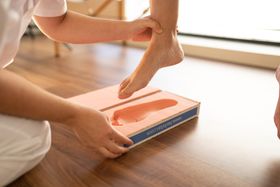Over-The-Counter Insoles vs. Custom Orthotics: Which One Is Right for You?
Updated January 29, 2024

Although the words "custom orthotics" and "insoles" are often used interchangeably, there is a distinction between the two. As the name suggests, custom orthotics are insoles made specifically for you on a doctor/podiatrist's prescription. On the other hand, over-the-counter (OTC) insoles refer to one-size-fits-all shoe inserts that can be purchased in any pharmacy.
Custom Orthotics vs. Over-The-Counter (OTC) Insoles
To get the best possible fit and comfort, you should get orthotics custom-made specifically to fit your foot's unique characteristics. With Upstep, you can place an order online and provide some medical and lifestyle information, and we will send you an impression kit to make a custom imprint of your feet.
After returning the impression kit to us, our experts will analyze your feet and the information you provided to design a pair of custom orthotics made specifically for your needs.
» Need some extra comfort? Consider some everyday orthotics from Upstep.
Are Custom Orthotics Better Than Store-Bought?
There is no straight answer to this question. Rather, whether the better one is the custom orthotics or OTC orthotics will depend on the user's particular circumstances.
For example, an over-the-counter insole provides general cushioning and some arch support. However, given that people's feet are shaped differently and have different foot conditions, an off-the-shelf orthotic cannot provide the specific components required by each individual.
Read on to compare the pros and cons of custom orthotics and OTC insoles.
Pros of Custom Orthotics
- Designed to fit Custom orthotics are usually designed to the specification of the foot and the condition of the client who needs it. Invariably, this makes them more comfortable and more effective in dealing with foot problems.
- Better Quality Compared to OTC insoles, custom orthotics are often made with better quality materials, guaranteeing better support and longer-lasting durability.
- Better support Often, the materials with which custom orthotics are made are more rigid. Thus, they offer better support than prefabricated orthotics usually made from rubber or silicone.
- More cost-effective in the long run Compared to off-the-shelf orthotics, custom orthotics tend to be more expensive. However, the cheaper insoles break down and wear out quickly, making custom orthotics the cost-effective option when you're looking at long-term options.
» Read the review of the Upstep orthotics for flat feet
Pros of Over-The-Counter Insoles
- Cheaper alternative Standard insoles are cheaper than custom-made orthotics and would be a good option for individuals with mild conditions.
- Quick fix When the goal is quick pain relief, you may not have the luxury of time to wait for a custom orthotic to be fabricated. In that case, prefabricated orthotics become the better choice. You can easily cut and add them to your shoes in minutes to get quick relief.
» Find the best insoles for flat feet to provide ease and comfort
Cons of Custom Orthotics
- High upfront cost It costs way more to make an initial purchase of a custom orthotic than an over-the-counter orthotic because of the materials and specialized labor.
- Time constraints While you can just walk into a store and purchase a prefabricated orthotic, you will need to give a podiatrist time to make your orthotics. It takes an average of two to three weeks (in which you'll still experience pain) to make a pair of custom orthotics.
Cons of Over-The-Counter Insoles
- Temporary fix While prefabricated orthotics can bring quick pain relief, it is often short-lived as they don't address the condition. Instead, they often cause damage by giving too much support to one foot or not enough to the other, which can mess with your alignment, balance, posture, and foot health.
- No health insurance rebate While custom orthotics are covered by the HSA and LPFSA (meaning you can be reimbursed when you purchase them with your own money), the same is not true for OTC insoles. There is no health insurance coverage for them as anyone can easily buy them without a doctor's advice or prescription.
- Less durability Since OTC orthotics are made from lower-quality materials, they are often less durable. Thus, they tend to break down easily and quickly show wear and tear.
The Final Verdict: Which Product Is Right for You?
Custom orthotics are made of better-quality materials and tend to last longer than OTC insoles. For quality arch support and comfort, you should always go with custom orthotics, as they are definitely worth it.
They can help correct your gait or posture, relieve foot pain, and improve balance. Since they are crafted to treat your specific ailments, they are inevitably more successful than prefabricated insoles.
However, if the goal is quick pain relief and the condition is mild, an over-the-counter insole might be all you need.








